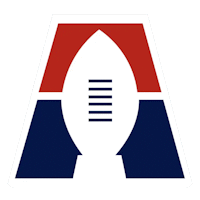
Arena Football League Looks for Answers as It Eyes Future
by Paul Reeths
Published on July 31, 2024 under Arena Football One (AF1)
The Arena Football League has entered its offseason amidst uncertainties about its future and a lack of clear answers.
Following a tumultuous 2024 debut campaign punctuated by the removal of its commissioner and the collapse of half its teams, the AFL faces a comprehensive review of its business strategy.
The league's eight surviving members - the Albany Firebirds, Billings Outlaws, Nashville Kats, Orlando Predators, Salina Liberty, Southwest Kansas Storm, Washington Wolfpack and Wichita Regulators - are spread nearly coast-to-coast in cities large enough to house NFL and NBA franchises, all the way down to relatively small communities in the Great Plains.
The AFL's first order of business should be deciding which of its teams are ready and willing to play another year. Even if some teams are contractually bound to the AFL, the league must decide whether to retain them if they are unable to compete.
Franchises began 2024 intending to pay players $1,000 game, much more than players typically earn in other indoor leagues, ensuring the league would be able to attract the best available talent. Several teams had agreed to that pay structure on the condition that the league would pay three-fourths of the amount, $750 per player per week.
When league assistance didn't arrive, some owners scrambled to reduce payroll, knowing that their ticket sales and sponsorships could not cover the full amount. While others such as Albany, Billings, Nashville and Salina reportedly maintained the original player pay, at a significant loss in some cases, others cut pay to the same amount they had paid during their time in indoor leagues, $200 per game, or one-fifth the amount others were paying.
Some players balked at the reduction and eventually left their teams. An attempt to reduce pay in Rapid City, SD, for example, led to a pre-game player revolt, a severe blow from which the Marshals could not recover. The loss of talent led to an imbalance between teams which could pay and those which could not.
Several teams will face the same economic reality moving forward. The AFL has to reach a consensus on a salary structure that preserves competitive balance, enabling smaller market teams to rival their counterparts in larger cities. Without support from the league, it might be necessary to consider letting go of some markets.
The league planned to play a 10-game season in 2024, but no team ended up competing every week. Orlando played at home just twice in the regular season. With only five planned home dates on average, franchises had limited opportunities to collect ticket revenue, and sponsorship rates were reduced compared to a longer season. The AFL may examine lengthening its 2025 campaign to provide more revenue opportunities.
Instability plagued the league from start to finish. The city of Lake Charles evicted the Louisiana VooDoo from its arena just a week before the season started. The Georgia Force hadn't announced a home when the league kicked off. Franchise failures and schedule shuffling became a weekly occurrence in 2024.
To regain the trust of loyal followers and expand its fanbase, the league must avoid any further missteps. This requires a meticulous review of any potential expansion, ensuring that new teams are thoroughly vetted and, at minimum, fulfill their 2025 commitments to fans and sponsors.
The league had announced expansion to Phoenix and Chicago in 2025 under the original commissioner, but it remains to be seen whether either organization is still in the AFL's plans.
The AFL also faces the task of determining the role of television broadcasting in its immediate future. A deal that required the league to pay the NFL Network $1.3 million per year collapsed before the network could televise even a single game. As a last-minute alternative, the league struck an agreement with CBS Sports Network to showcase its postseason, although this pact reportedly incurred a substantial broadcasting fee.
In lieu of a broadcast agreement, AFL games appeared on YouTube for much of the season. The league will have to decide how important a television partner is to exposing its product to more viewers, particularly if it has to pay for the privilege.
From a leadership standpoint, the league appears to be on much firmer footing compared to a year ago when former Commissioner Lee Hutton's staff featured little relevant experience.
Former NFL coach Jeff Fisher stepped into the void to become the AFL's interim Commissioner during the season, while former Commissioner Jerry Kurz and others joined the league office staff. In addition, members of G6 Sports Group, which owns the AFL's intellectual property, became more actively involved in operations.
The Arena Football League's leadership faces a critical test this offseason amid numerous questions about the league's viability. Can the AFL overcome the calamities of 2024 and chart a path to rebuild and grow the league in 2025 and beyond?
Arena Football One Stories from July 31, 2024
- Arena Football League Looks for Answers as It Eyes Future - OSC Original by Paul Reeths
- Arena Football League Looks for Answers as It Eyes Future - OSC Original by Paul Reeths
- Arena Football League Looks for Answers as It Eyes Future - OSC Original by Paul Reeths
The opinions expressed in this article are those of the writer(s), and do not necessarily reflect the thoughts or opinions of OurSports Central or its staff.

